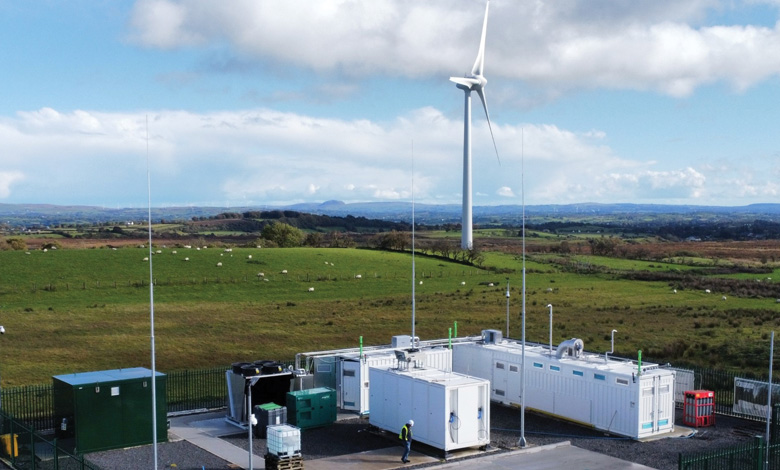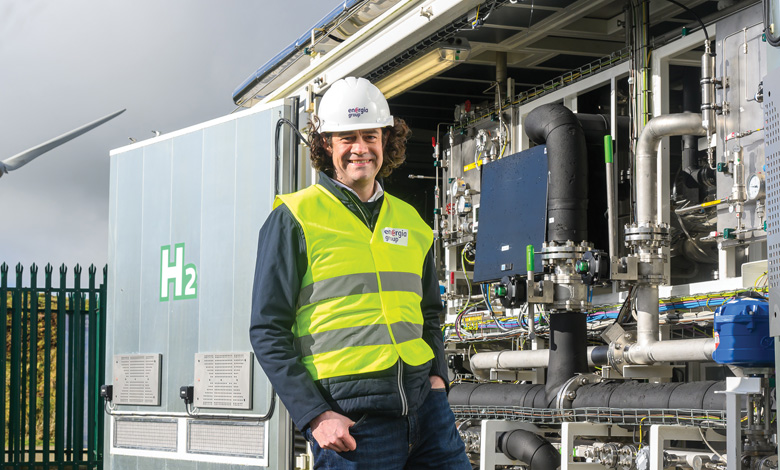Innovation driving the energy transition

Energia Group’s Long Mountain wind farm is the first in Ireland and the UK to produce green hydrogen on-site and highlights the potential for hydrogen in the energy transition, writes David Macartney, Corporate Development Director, Energia Group.
Green hydrogen produced on a wind farm and being used to power zero emissions urban busses, sounds like something that might be happening in a forward-thinking country at the forefront of energy decarbonisation. What many people perhaps do not realise is that it is happening in Northern Ireland today as a result of the investments Energia Group has made to further broaden our focus on the energy transition to complementary technologies we think will play a supporting part along the pathway to net zero.
The specific role for green hydrogen in the future is unclear, but with over three years’ experience of hydrogen infrastructure and the supply chain required to support these investments, we have developed an expert understanding of many facets of the technology. This has enabled us to successfully apply for funding and working collaboratively with academic and industry partners on a number of initiatives that explore the role hydrogen can play in the decarbonisation of the energy.
Our green hydrogen journey so far
Over three years ago, utilising a temporary hydrogen refuelling station, we powered the first hydrogen bus in Belfast. In a series of further firsts on the island, Energia Group had the first consented green hydrogen electrolyser facility, the first green hydrogen production from a wind farm and the first permanent hydrogen refuelling station. Our hydrogen refuelling station at Milewater Road in Belfast has dispensed over 21,000 kilograms of hydrogen for zero emission busses manufactured by Wrightbus and operated by Translink around Belfast.
Supported by EU funding through the GENCOMM project, Energia Group has installed a 1MW electrolyser on our Long Mountain wind farm in County Antrim. The electrolyser has been producing green hydrogen from the renewable electricity generated at the wind farm, including that which would otherwise have been lost to system constraints and curtailment, since June 2023. The on-site electrolyser converts this energy to green hydrogen via electrolysis, whereby the electrolyser splits water molecules from an on-site borehole into hydrogen and oxygen.
We also created a consortium of partners and led the funding application for a £4 million UK OZEV grant for the supply of three double deck busses (now owned by Translink) and the hydrogen refuelling station in Belfast. All of this initial activity has also been a catalyst for the further expansion of the hydrogen bus fleet in Belfast, with 20 additional busses ordered by Translink, produced in Ballymena by Wrightbus and delivered in 2022.
The wider opportunities
Energia Group’s leadership in this space has helped to support the development of an emerging green hydrogen sector in Northern Ireland and with the Northern Ireland Energy Strategy and the Irish Government’s Hydrogen Strategy, we are well positioned to explore future opportunities for hydrogen on the island.

While a number of potential use cases for green hydrogen are apparent, the further deployment continues to be affected by what is effectively the chicken or the egg paradox, in relation to the supply and demand for green hydrogen. In anticipation of specific policy supports for green hydrogen, we have sought to overcome this challenge through partnership and collaboration with businesses, the public sector and academia. A number of colleagues are currently involved in green hydrogen focused groups, including within Wind Energy Ireland and Hydrogen Ireland, as well as with Queen’s University Belfast, Ulster University, GENCOMM Interreg, and the National Standards Authority of Ireland.
Another very interesting project that we are very proud to be part of is the Belfast Maritime Consortium, led by Artemis Technologies. The consortium was successful in a UK Government funding round and received a £33 million innovation grant to develop zero emissions electric hydrofoil ferries in Belfast. As the consortium’s energy partner, Energia Group is responsible for the installation of the electric hydrofoil charging infrastructure and we have assisted in a trial for the future use of hydrogen. The Artemis project is significant globally and locally, as it will utilise the potential of zero carbon hydrogen fuel cells as part of the effort to decarbonise maritime transport. It will also lead to more than 1,000 jobs being created in Northern Ireland over a ten-year period.
What is next?
Energia Group has consent for the development of a 4MW electrolyser at its Rathsherry wind farm in County Antrim and we are looking at other opportunities across the island of Ireland. Crucial to our ability to invest further in green hydrogen will be the progression of the hydrogen strategies of the respective governments in Ireland and Northern Ireland, to the implementation of clear and certain policies. Policymakers will have to consider the end-to-end use cases for green hydrogen, including the transportation and storage of the gas, as well as how to facilitate the supply chain required to support hydrogen’s role in decarbonisation.
As the first of its kind in Ireland or the UK, our Long Mountain electrolyser has proven our ability to produce green hydrogen on a wind farm. Our partnerships have proven some of the use cases for that green hydrogen. Our plans for the future will be largely dependent on policies that can create demand and support the production of green hydrogen that can play an important role in assisting to decarbonise the so called hard to abate sectors on the island.






